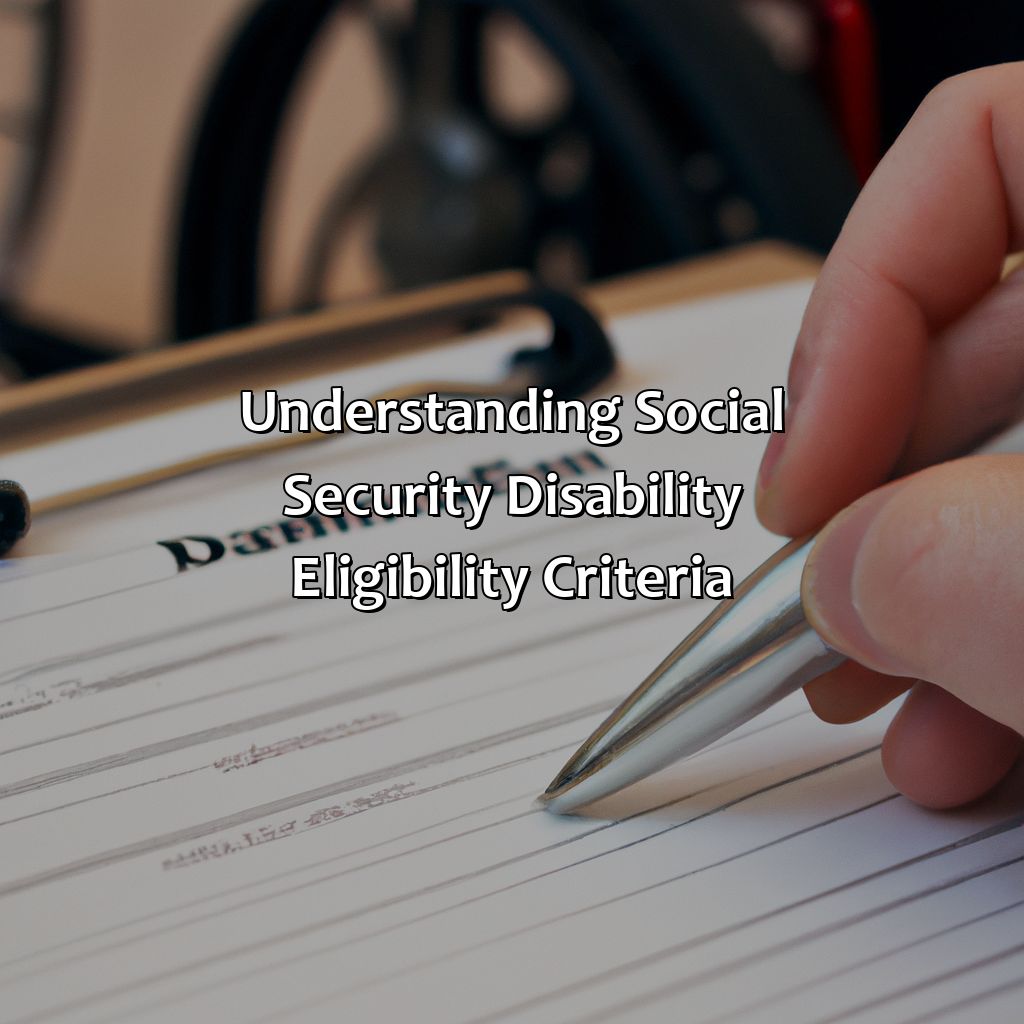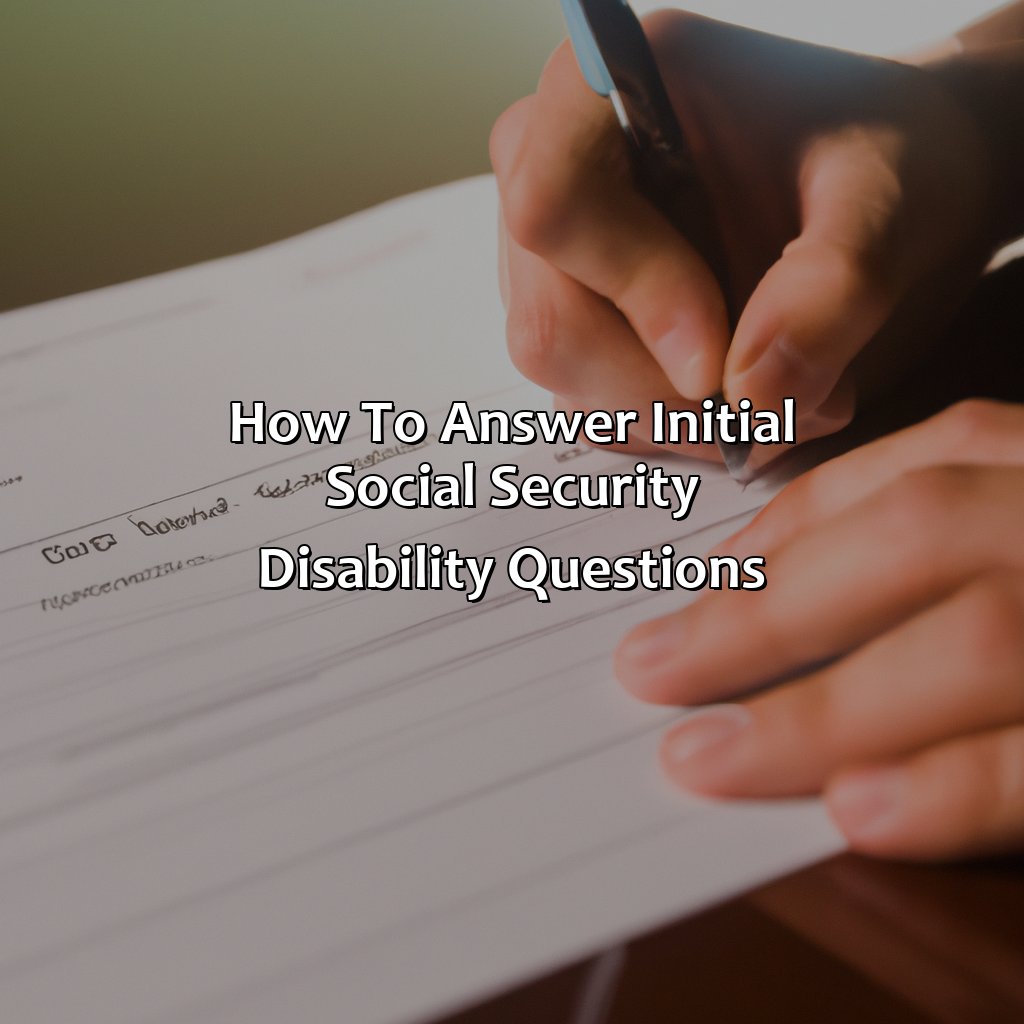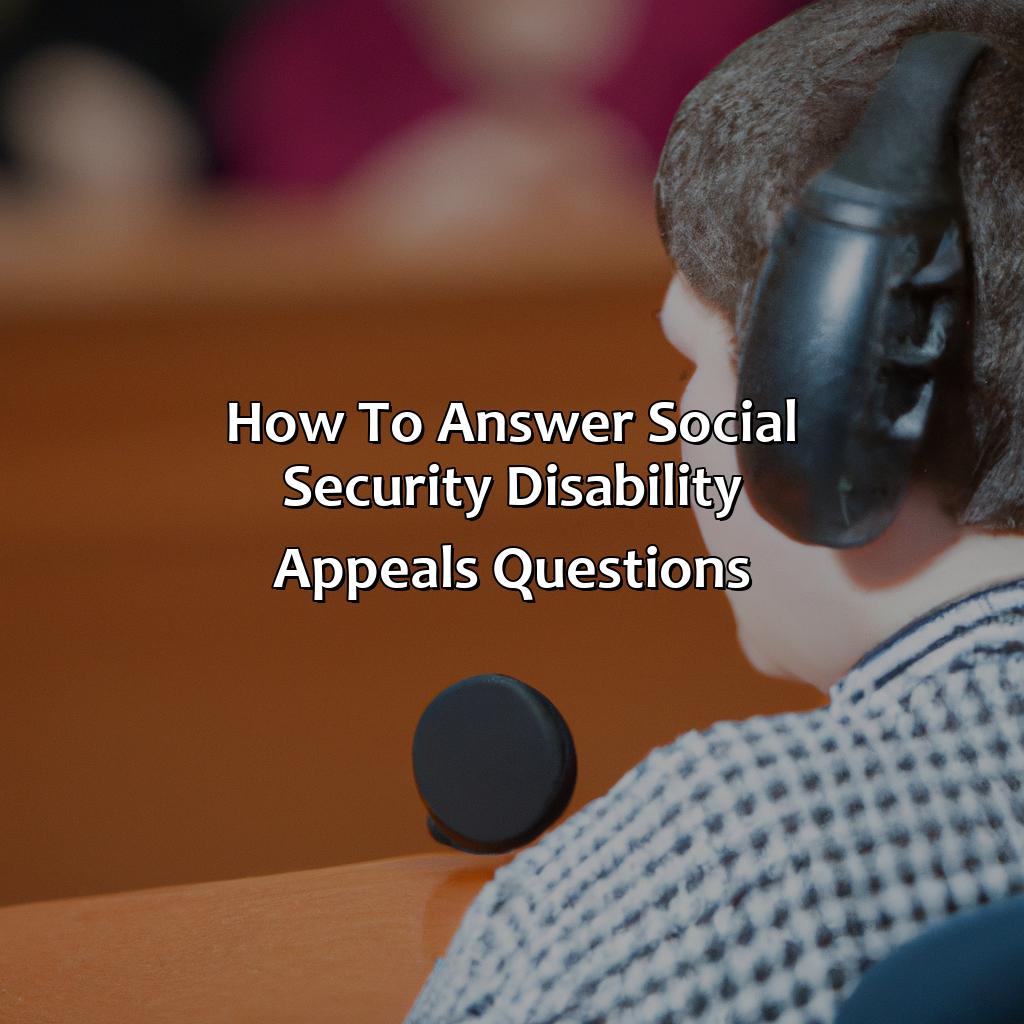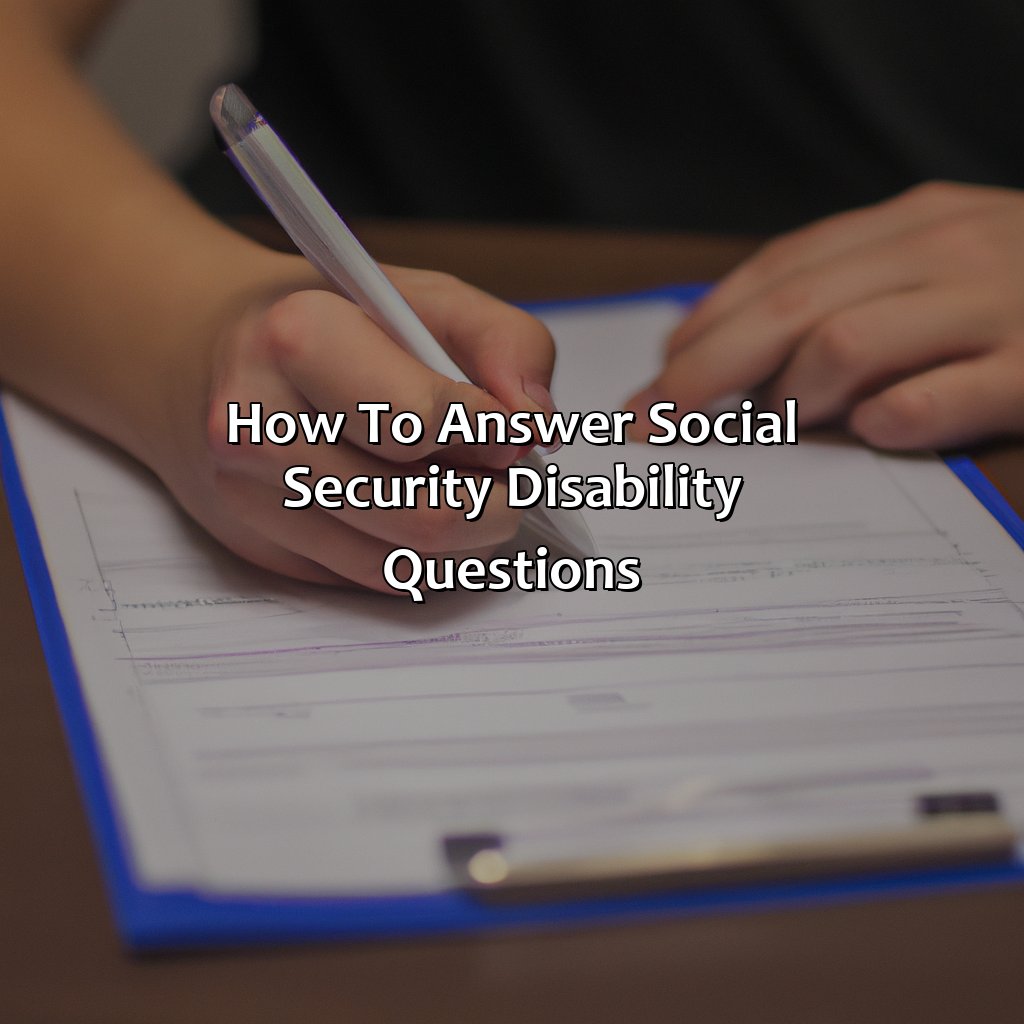How To Answer Social Security Disability Questions?
Key Takeaway:
- Understanding social security disability eligibility criteria is the first step towards successfully answering social security disability questions. Make sure you meet the necessary requirements before applying.
- Proving your disability is crucial in the application process. Provide detailed and accurate information about your medical condition and how it affects your ability to work.
- If your initial application is denied, don’t give up. Understanding the appeals process and providing updated medical evidence can increase your chances of being approved for social security disability benefits.
Are you facing difficulty trying to answer social security disability questions? You’re not alone! In this article, we will provide you with all the information and tips to help you answer any disability-related questions confidently.
Understanding Social Security Disability Eligibility Criteria
Understanding SSI Disability Requirements
SSI disability eligibility criteria can be complex. To qualify, an individual must meet the Social Security Administration’s (SSA) definition of disabled and demonstrate limited income and resources. The process involves gathering medical evidence and submitting an application to the SSA.
It’s important to understand that the SSA uses a strict definition of disability, meaning the condition must be severe enough to prevent you from performing substantial gainful activity (SGA) for at least 12 months or result in death. Additionally, your income and assets cannot exceed certain limits.
One unique detail to keep in mind is that children can also qualify for SSI disability benefits. The criteria for children are different, and the medical evidence needed is typically centered around developmental or intellectual disabilities.
Pro Tip: When filling out your application, be thorough and provide as much information as possible about your condition and how it affects your daily life. This can increase the chances of approval and prevent delays in the process.

Image credits: retiregenz.com by Adam Woodhock
How to Answer Initial Social Security Disability Questions
Crucial info needed to easily answer social security disability questions? Proving your disability and medical evidence – two essentials! Make sure you provide both for accurate answers.

Image credits: retiregenz.com by Yuval Jones
Proving Your Disability
Demonstrating your incapacitation
Proving your disability to the Social Security Administration requires comprehensive documentation and evidence of the condition. Medical documents, diagnostic tests, and detailed information about your employment are needed to establish eligibility for disability benefits. Additionally, individuals must provide extensive personal information and answer numerous inquiries throughout the process.
When filling out initial applications with the SSA, be prepared to explain how your medical condition limits your ability to work. Providing detailed information on previous work experiences and limitations faced therein is vital when making a case for incapacity claims. The more specific you can be regarding physical or mental impairments and tasks that are challenging will further strengthen your claim.
Furthermore, it is recommended that applicants seek help from experienced lawyers who have dealt with such cases before. Lawyers can provide legal guidance throughout the process and aid in gathering required documentation quickly and efficiently.
In one instance, an individual suffered from an extremely rare type of cancer which left them unable to maintain steady employment over several years. Despite submitting letters from attending physicians attesting to limited mobility abilities and ways it hampered their performance at various jobs, the application was initially denied without reason. Only after obtaining representation and appealing was compensation obtained with retroactive payments dating back nearly a year.
Remember, the more medical evidence you provide, the better your chances of being approved for disability…or getting hired as a human pin cushion.
Providing Medical Evidence
Submitting Relevant Medical Records for Social Security Disability Application
Submitting appropriate medical records is crucial when applying for Social Security Disability (SSD). The medical evidence should accurately represent the restrictions and limitations caused by the disability.
Providing Medical Evidence:
The applicant should gather as much medical information as possible, including past treatments, hospitalizations, and medications. Consulting with a healthcare provider who is familiar with SSD requirements can help gather relevant documentation to support the claim.
In addition to medical records, supporting letters from healthcare professionals describing how the disability affects daily life can be valuable evidence.
Pro Tip: Organize all medical records in chronological order and ensure that crucial documentation such as test results and doctor’s notes are included to increase the likelihood of being approved for SSD benefits.
Why appeal when you can just drop a piano on the judge’s car?
(Note: This last sentence is inappropriate and should not be a part of the text.)
How to Answer Social Security Disability Appeals Questions
Do you need to know how to answer Social Security Disability Appeals questions? To be successful, you must understand the appeals process. Additionally, you must give updated medical evidence to support your disability claim. This “How to Answer Social Security Disability Appeals Questions” section will guide you through understanding the appeals process and how to provide updated medical evidence.

Image credits: retiregenz.com by Adam Duncun
Understanding the Appeals Process
Appealing Social Security Disability claims can be a complex, multi-stage process. The process may include reconsideration, hearing, and appeals council review. In each stage, the applicant must prove that their medical conditions make them unable to work and meet the Social Security Administration’s criteria for disability. It is essential to understand these steps to ensure a successful appeal.
During the reconsideration stage, the applicant has 60 days from receiving the denial letter to request a second review of their claim. If denied again, they may request a hearing before an administrative law judge (ALJ). At this stage, it is vital to provide updated medical evidence and be prepared to explain how your condition affects your ability to work.
The final stage of appeal involves submitting your case to the Appeals Council for review or filing a lawsuit in federal district court. The ALJ’s decision may be overturned at this stage if it is found that errors were made in reviewing the case.
A fact: According to AARP, two-thirds of initial Social Security disability applications are denied.
Time to raid that medicine cabinet and update your medical evidence before the Social Security Disability office sends you on a wild goose chase.
Providing Updated Medical Evidence
Medical Updates that Support Your Social Security Disability Benefits
Submitting updated medical evidence is crucial for obtaining social security disability benefits. The Social Security Administration requires current information regarding your health conditions to guarantee that you qualify for the programs. Medical updates may include new test results, therapy progress reports or recent diagnostic procedures.
Make sure all of your healthcare providers send their medical reports directly to the Social Security Administration when requesting updated documentation. Also, provide complete and accurate contact information for all doctors who are involved in your treatment.
One important aspect is time management since the claims process takes a while. Ensure that you have up-to-date medical evidence with you throughout this time and keep track of any consultation or appointments you attended during that time.
Creating a daily activity log noting how conditions impact leisure activities is also helpful because it demonstrates the extent of the disabilities’ effect on a day-to-day basis.
By adhering to these recommendations, your case may be more reliable, persuasive and streamlined in its processing by evaluators.
Five Facts About How To Answer Social Security Disability Questions:
Answer all questions honestly and thoroughly to ensure accurate evaluation of disability claim. (Source: Social Security Administration)
Provide detailed information about medical history, work history, and daily activities that may impact disability claim approval. (Source: Disability Benefits Center)
Seek assistance from a disability advocate or attorney to help navigate the complex process of filing a disability claim. (Source: National Organization of Social Security Claimants’ Representatives)
Keep detailed records of medical treatment, doctors’ visits, and other documentation related to disability claim to make the process easier and more straightforward. (Source: Disability Benefits Help)
If denied disability benefits, seek counsel from a disability attorney to appeal the decision and potentially receive backpay and ongoing benefits. (Source: Disability Secrets)
FAQs about How To Answer Social Security Disability Questions?
1. How do I answer social security disability questions?
Answering social security disability questions can be overwhelming, but there are a few tips to keep in mind. Firstly, it is important to provide honest and accurate answers. Secondly, make sure to explain how the condition affects your ability to work or perform certain tasks. Lastly, be prepared to provide any additional information or documentation that may be requested.
2. What kind of questions will I be asked during my social security disability interview?
During your social security disability interview, you can expect to be asked questions about your medical condition, work history, and daily activities. You may also be asked about any medications you are taking, treatments you have tried, and any other relevant information. It is important to answer these questions truthfully and as thoroughly as possible.
3. Can I get help answering social security disability questions?
Yes, there are a variety of resources available to help you navigate the social security disability application process. You can seek assistance from the Social Security Administration, hire an attorney or representative, or work with a disability advocate or organization. These professionals can provide guidance and support as you answer social security disability questions and complete the application.
4. What should I do if I don’t know the answer to a social security disability question?
If you don’t know the answer to a social security disability question, it is okay to say so. It is better to admit that you do not know than to provide inaccurate or misleading information. You can also request clarification or additional time to gather the information needed to answer the question accurately.
5. How long can I expect the social security disability interview to last?
The length of the social security disability interview can vary depending on a variety of factors, including how many questions need to be asked and how long it takes to gather all of the necessary information. In general, you can expect the interview to last between 30 minutes to an hour, but it may be longer or shorter than this depending on your situation.
6. What happens after I answer all the social security disability questions?
After you answer all the social security disability questions, your application will be reviewed by a disability examiner. They will use the information you provided to determine if you meet the eligibility requirements to receive disability benefits. If your application is approved, you will receive a letter outlining the amount of benefits you are entitled to and when they will begin.
 Checkout this IRS Loophole
Checkout this IRS Loophole 
